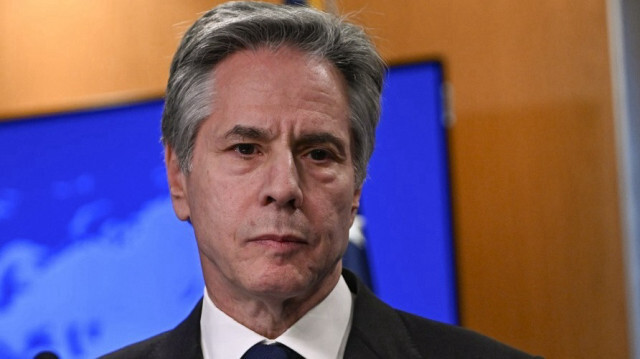
'ISIS remains a potentially potent force and one that we have to continue to deal with,' says top US diplomat before meeting with Iraqi counterpart
US Secretary of State Antony Blinken said Tuesday that last week's terrorist attack in Moscow is a reminder that Daesh/ISIS “remains a real threat.”
“And despite the very good work that we've done over the years in dealing with that threat and mitigating it significantly, we're reminded by the horrific attack outside of Moscow just a few days ago that ISIS remains a potentially potent force and one that we have to continue to deal with,” Blinken said before his meeting with Iraqi Deputy Prime Minister and Foreign Minister Fuad Hussein at the State Department.
“We mourn the loss of so many innocent lives, people going to a concert outside of Moscow. This is a very unfortunate reminder that we have to continue to deal with ISIS and make sure that it doesn't revive and regenerate,” he added.
At least 139 people were killed and more than 180 injured on March 22 when gunmen opened fire at Crocus City Hall in Krasnogorsk, Moscow Oblast.
Russia's Investigative Committee said it detained 11 people, including four perpetrators, in the border region of Bryansk, who were on their way to Ukraine.
Moscow's Basmanny District Court charged the four perpetrators late Sunday with terrorism and approved their pre-trial detentions until May 22.
Hussein said Iraq also suffers from Daesh/ISIS, adding: “This means that ISIS is still a threat for peace in the Middle East but also for security and peace somewhere else.”
State Department spokesman Matthew Miller said in a statement after the meeting that the two discussed cooperation on security and economic, political and diplomatic issues under the US-Iraq Strategic Framework Agreement.
Blinken and Hussein also previewed an upcoming meeting of the US-Iraq Higher Coordinating Committee and Iraqi Prime Minister Mohammed Shia al-Sudani's meeting with President Joe Biden at the White House on April 15.
“Both leaders reaffirmed their commitment to the Higher Military Commission process, which will enable the transition to a durable bilateral security partnership between Iraq and the United States and help to ensure the enduring defeat of ISIS,” Miller said.
Hussein also met with Acting Under Secretary of Defense for Policy Sasha Baker at the Pentagon.
According to the Pentagon readout, Baker expressed “appreciation for collective efforts to safeguard Iraqi, U.S. and Coalition Forces — reinforcing that attacks by Iran-aligned militia groups threaten the effectiveness of counterterrorism efforts, provide ISIS greater space to operate, and place innocent civilians at risk.”
The top Iraqi diplomat arrived in Washington on Friday to meet with US officials amid talks regarding the withdrawal of US forces from Iraq.
Hussein told Anadolu during an interview on the sidelines of the Antalya Diplomacy Forum earlier this month that the talks between Baghdad and Washington regarding the withdrawal of American troops from Iraqi soil continue.
Noting that the US troops were invited by the Iraqi government to fight against Daesh/ISIS, he added that the team participating in the talks will submit a report to Iraqi Prime Minister Al-Sudani soon.
Defense Secretary Lloyd Austin announced in late January that the US and Iraq will begin talks on a potential end to the US-led anti-Daesh/ISIS coalition's presence in Iraq.
Washington and Baghdad agreed last summer to the formation of the US-Iraq Higher Military Commission (HMC) and the defense chief said the looming commencement of the process "reflects the deep U.S. commitment to regional stability and Iraqi sovereignty."
Roughly 2,500 American troops remain in Iraq on a train and assist mission for Iraqi forces following the December 2021 announcement of the end of major combat operations in the effort to defeat the Daesh/ISIS terror group.
Hello, the comments you share on our site are a valuable resource for other users. Please respect other users and different opinions. Do not use rude, offensive, derogatory, or discriminatory language.
The floor is all yours.








